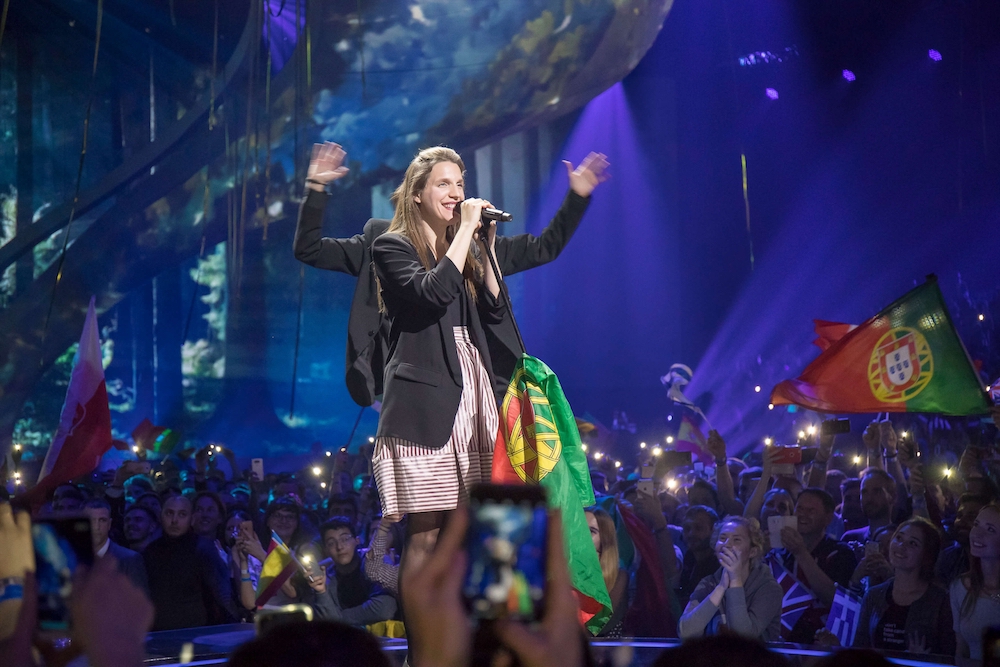
ABBA, Sobral. Why 2017 is a landmark year for Eurovision

ABBA, Sobral. Why 2017 is a landmark year for Eurovision
image: Andres Putting (EBU)
The Eurovision Song Contest 2017 threatened to be a pale, a dull year. I had this impression as late as the semi-finals, especially when my two big favourites Finland and Estonia were knocked out. But as soon as the final kicked off, I felt this year was special, that it was a turning point. For some reason, the happenings on stage felt so real. More real than the previous years. It felt like someone pushed a huge, invisible “reset” button. And that was before Salvador Sobral sang the first note of his song. And so this Eurovision Song Contest became a very fulfilling year for me and many friends. And yes, not so much for some other fans.
But if you’re a true fan, your love for the contest will survive 2017, no matter if you liked Portugal as the winner or not. Why? And what is a “true fan” anyway? Eurovision works like evolution. What we see year after year in the month of May is a case of natural selection. Some will give up being a fan because they don’t like the result. Survival of the fittest. Only the best fans survive. “Best” doesn’t mean the one who collected the most flags or CDs. It doesn’t mean the fan who took the most selfies with Eurovision stars. What it means is whether you’re a true fan in your heart over the years, and whether you can adapt to new situations. You’re only a true fan if you can make it through the years that really put your fandom to the test. I had my “test years” when Serbia won with a song that I perceived as highly unpleasant, followed by the victory of Dima Bilan, which doesn’t need any further explanation. Some of you are having your test years now, with Jamala and Salvador Sobral. Eurovision isn’t only about fun and party. You thought differently? You were wrong. Eurovision is still about music, and music doesn’t have any limits – not in general, and especially not at Eurovision. Don’t worry though, the fun will be back. In the contest, and in the winner’s reprise.
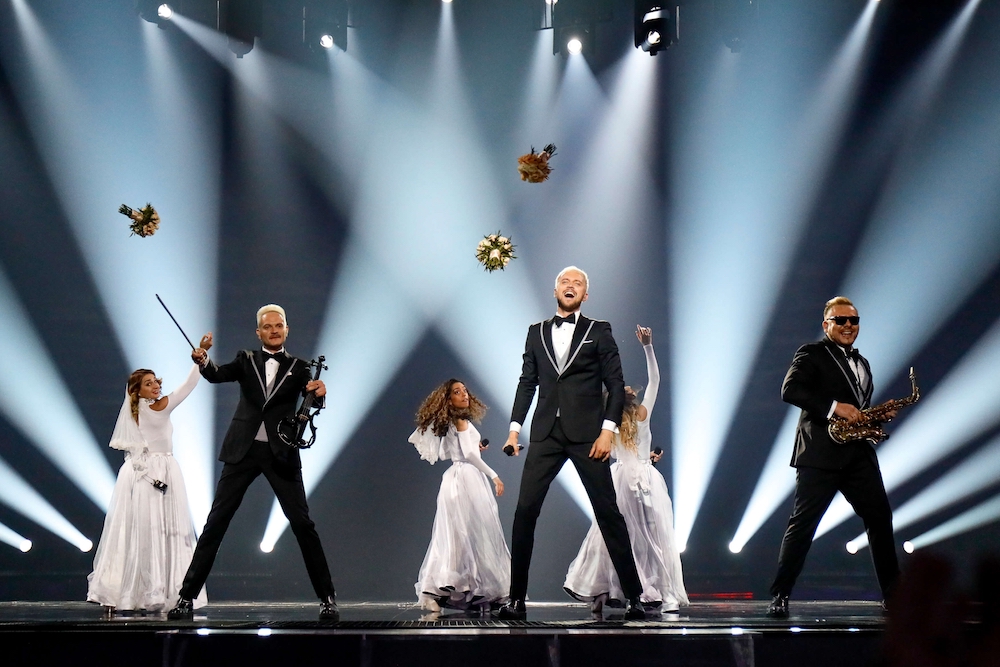
Fun is still very much alive. | image: Andres Putting (EBU)
But what I find so fulfilling about this year, what’s so important about Portugal winning with this entry, takes on many more levels.
At a time when countries hide singers backstage, when English becomes the rule for nearly all entries, when the live vocals of the actual performers are more and more “faked”, when the charts are full of anonymous mass productions, when no one has the time anymore to actually listen to music, when everyone thinks the winner is clear way before the rehearsals even begin, we get a Eurovision Song Contest that sees a landslide victory for a normal man who just stands there and sings his beautiful song. In Portuguese. Portugal won, not Italy. Music won, not the most spectacular stage show.
It’s so good to see that the Eurovision Song Contest still means something. That the winner isn’t decided before the Eurovision weeks even start, not by the bookmakers, nor by YouTubers who explain to the world well in advance why Italy will win the Eurovision Song Contest. If we all knew so well in advance, we wouldn’t need to hold a contest anymore.
Portugal’s victory is a victory we can also see as our own. Not necessarily you, but maybe you. “We”, as in “the underdogs”. Portugal teaches each and every one of us to stay true to ourselves, even if it takes half a century before we succeed with what we do naturally – without alienating ourselves.
Portugal’s victory is a victory for songwriters. It’s an iconic victory for them, as they are what the Eurovision Song Contest actually is about. You didn’t know? Take another look at the name: Eurovision Song Contest. It’s not a singing contest. It’s not a performer contest. It’s a song contest. Who is the main artist behind a song? The person who wrote it!

The return of the songwriter. | image: Andres Putting (EBU)
Portugal’s victory is a victory for Eurovision itself. It’s a clear sign that pure music is still valued and recognised in all corners, in all cultures of Europe, no matter what language or what country. It’s Eurovision’s own victory, because this song winning demonstrates that the contest is still open and that anything, in any style, from any country, in any language, can win – as long as it’s good and it touches the hearts of the European people. It’s Eurovision’s own victory, because it shows the world the competition is still fair and relevant (after this victory, probably more so than in the past decades).
Portugal 2017 must be the anti-hero of SVT. The nightmare of the Swedish establishment, who seem to love nothing more than a performance that is completely planned-through into the smallest detail and will always be the robotic same. Who seem to want to kill any spontaneous artistic expression at the root. Who seemed like they needed to teach the rest of Europe how to do Eurovision “properly” (in their eyes). Who seemed to force their standards upon the whole contest. Who – deliberately or not – seem to have established colonies in Azerbaijan, Serbia, Macedonia, Bulgaria, Cyprus, Ireland and other countries, in a condescending attempt to take over the whole of Europe, the whole of our Eurovision. They failed. Europe has emancipated itself from the Swedish establishment.
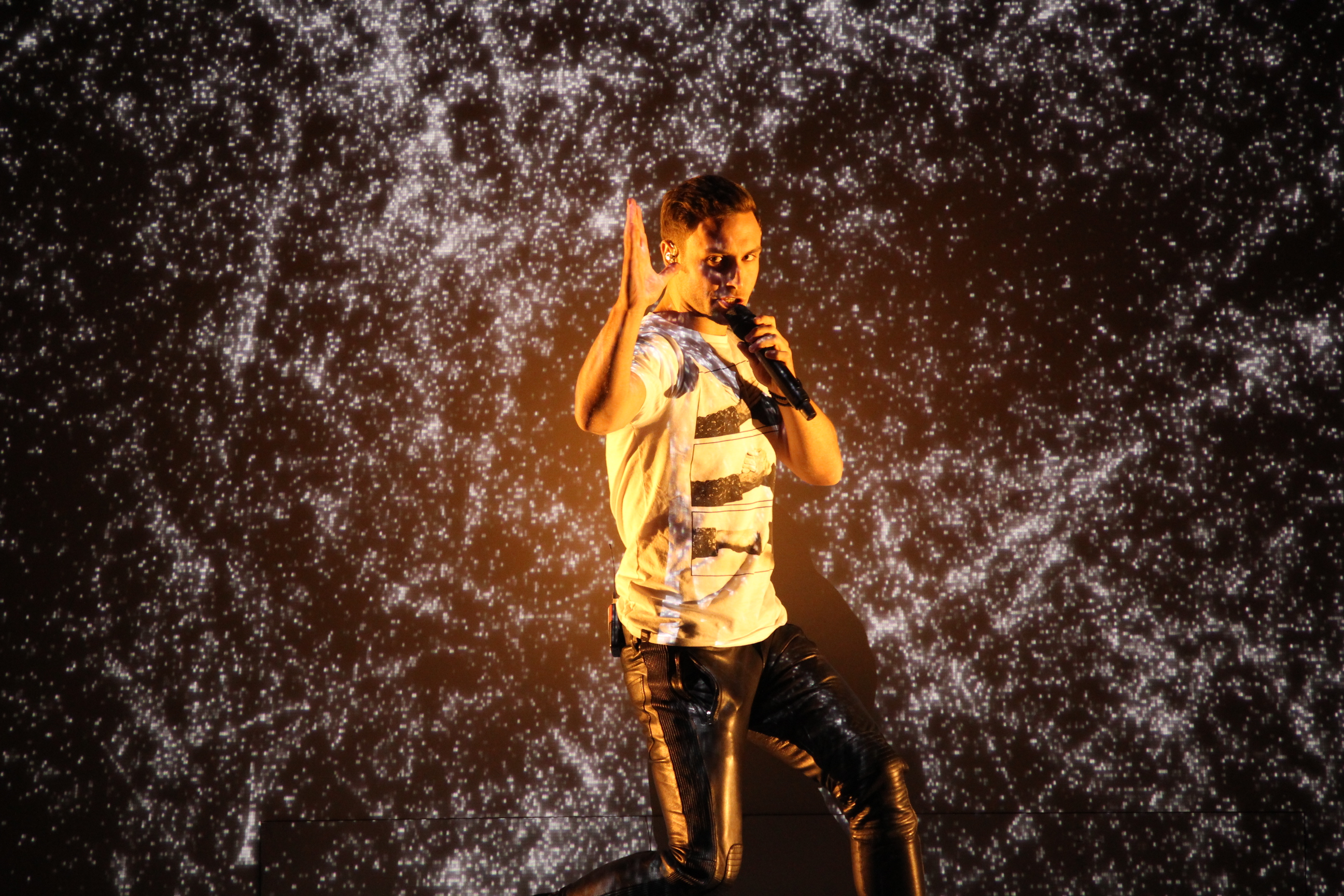
no room for improvisation | image: Felix Krückau (escgo!)
The victory of Salvador Sobral is a turning point in Eurovision history. It’s probably the most important victory since ABBA. It introduces a new paradigm. Not a paradigm that takes Eurovision completely away from the ABBA influence, but one that empowers non-pop music in the contest. Jamala paved the way already. Salvador Sobral is the turning point. It brings the international, multicultural aspect of Eurovision back into the spotlight. It reanimates the heart of Eurovision. I don’t want a Swedish Eurovision. I want a pan-European Eurovision. And yes, this includes Anna Book, Eric Saade, Samir & Victor or Björn Ranelid feat. Sara Li. I never said I don’t love them.
Also, in case you get me wrong: I love the glitter, the fireworks, the plastic, the kitsch at Eurovision. I love the Solayohs and the Leto Svets. The Anmarys and the Cezars. I don’t want this kind of Eurovision to die out. But I want Eurovision to be free for everything, free for pure quality music that is not aligned with the Eurovision cliché, free for stuff that isn’t fully compliant with Swedish and other mainstream standards – and this includes the winner’s podium.
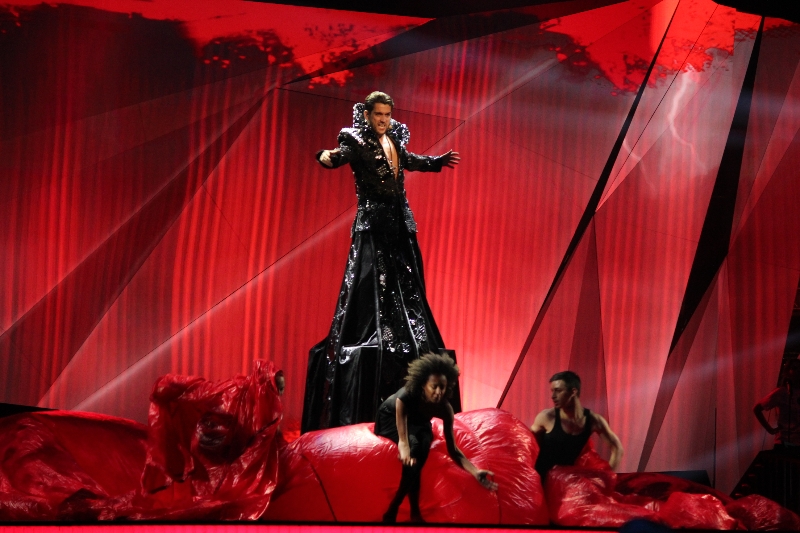
Eurovision is all kinds of everything. | image: Felix Krückau (escgo!)
The Eurovision Song Contest isn’t (just) about party. The Eurovision Song Contest isn’t (just) about mainstream music. The Eurovision Song Contest isn’t (just) about music, either. And the Eurovision Song Contest isn’t (just) about specific standards. The Eurovision Song Contest is about everything and anything between Reykjavik and Yerevan.
The huge invisible reset button has been pressed. Successfully.
Salvador means “Saviour”.
The Eurovision Song Contest is free.
Visit our Eurovision Chat!
3 Comments
3 Comments
-
Robyn on May 28, 2017 at 11:54 am
An enjoyable read! Something to remember – the second and third placed songs went to two of the most modern pop entries (one a ballad, one a dance track) with incredibly slick staging. (And fourth and fifth places were also modern pop productions.)
One could also argue that “Amar pelos dois” won because of those pop songs, not in spite of them. If we’d heard 25 other folky/jazzy/non-English ballads that evening, Salvador’s song wouldn’t have had the same impact. Having Salvador follow the very shouty Anja was a genius move from Björkman – Salvador was the gentle waterfall after Anja’s diva avalanche.
So next year is going to be interesting. I suspect we’ll see lots of other countries trying to capture Portugal’s winning magic, but just like all the Dami Im-inspired wannabe divas in Kyiv, none of them will have the same luck. Is the clue to standing out – figure out what everyone else will do, then do the opposite?
-
Mike Homfray (Merseymike) on May 22, 2017 at 12:11 pm
I certainly had moments of despair – interestingly I loved 2007 and 8, but that was after five years of disliking the winner and then in 2009 my most hated winner ever happened, so….but yes, both this and last year shows that you can win without something which corresponds to any formula. And that has to be good.
-
Howard on May 19, 2017 at 4:39 am
You sound paranoid. I don’t buy your accusation about the “Swedish establishment” trying to control every other country. What about Sanna Nielsen’s “Undo”? Why is Sobral’s song better? Perhaps you could expand on your problem with Maria Serifovic & Dima Bilan, I have no clue what you’re talking about. I’m not giving up on Eurovision just because my favorite songs do poorly, and songs that finish high are those I dislike. That will always be the case, and there is nothing special about 2017.
Visit our Eurovision Chat!
Follow us:
Shkodra Elektronike from Albania are the winners of ChatVote 2025!
The 21st annual edition of ChatVote is over, and the best song in the forthcoming Eurovision Song Contest is the entry from… Albania!
SongHunt 2025: Detailed results
Time to reveal the full results of SongHunt 2025, including the top ranks of the semi-finals and the split results of the final!
ChatVote 2025 is launched – the voting lines are open!
It’s time for the 21st edition of our legendary annual event. For our chat regulars, the lines are now open for you to submit your votes!
“This Dream Of Mine” by Arwin is the winner of SongHunt 2025!
Our chat community and the public have decided: “This Dream Of Mine” by Arwin from Sweden is the most ROBBED song of the 2025 Eurovision national final season!
ESC 2025: Semi-final running orders revealed!
Who’ll be singing where in which semi-final? It’s the big question – and the official Eurovision YouTube account revealed all this evening!
SongHunt 2025 – Semi-final 3
The SongHunt continues! Semi-final 3 is open and YOUR votes will help to decide who qualifies, so get involved!
SongHunt 2025 – Semi-final 2
The SongHunt continues! Semi-final 2 is open and YOUR votes will help to decide who qualifies, so get involved!
SongHunt 2025 – Semi-final 1
Let the SongHunt begin! Semi-final 1 is open and YOUR votes will help to decide who qualifies, so get involved!
SongHunt 2025 is launched!
It’s time for SongHunt 2025! The public polls and chat events are nearly upon us, and there are some changes you’ll want to know about – so read all about it here and save the dates in your calendars!
Potted Basel: Allocation draw for 2025 takes place
Today saw the allocation draw for the 2025 Eurovision Song Contest to be held in Basel, Switzerland. Here’s how the countries will line up in the two semi-finals!
Shkodra Elektronike from Albania are the winners of ChatVote 2025!
The 21st annual edition of ChatVote is over, and the best song in the forthcoming Eurovision Song Contest is the entry from… Albania!
SongHunt 2025: Detailed results
Time to reveal the full results of SongHunt 2025, including the top ranks of the semi-finals and the split results of the final!
ChatVote 2025 is launched – the voting lines are open!
It’s time for the 21st edition of our legendary annual event. For our chat regulars, the lines are now open for you to submit your votes!
“This Dream Of Mine” by Arwin is the winner of SongHunt 2025!
Our chat community and the public have decided: “This Dream Of Mine” by Arwin from Sweden is the most ROBBED song of the 2025 Eurovision national final season!
escgo! on Twitter

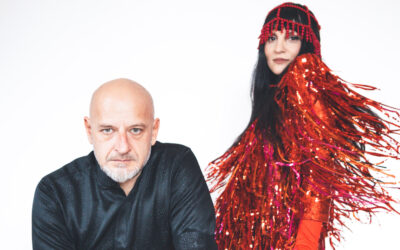

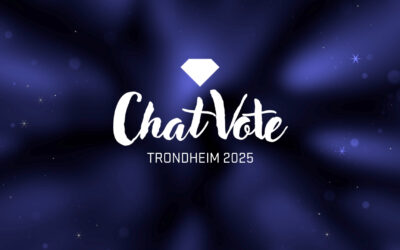

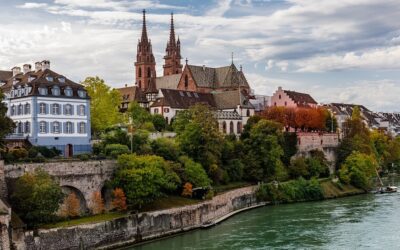
An enjoyable read! Something to remember – the second and third placed songs went to two of the most modern pop entries (one a ballad, one a dance track) with incredibly slick staging. (And fourth and fifth places were also modern pop productions.)
One could also argue that “Amar pelos dois” won because of those pop songs, not in spite of them. If we’d heard 25 other folky/jazzy/non-English ballads that evening, Salvador’s song wouldn’t have had the same impact. Having Salvador follow the very shouty Anja was a genius move from Björkman – Salvador was the gentle waterfall after Anja’s diva avalanche.
So next year is going to be interesting. I suspect we’ll see lots of other countries trying to capture Portugal’s winning magic, but just like all the Dami Im-inspired wannabe divas in Kyiv, none of them will have the same luck. Is the clue to standing out – figure out what everyone else will do, then do the opposite?
I certainly had moments of despair – interestingly I loved 2007 and 8, but that was after five years of disliking the winner and then in 2009 my most hated winner ever happened, so….but yes, both this and last year shows that you can win without something which corresponds to any formula. And that has to be good.
You sound paranoid. I don’t buy your accusation about the “Swedish establishment” trying to control every other country. What about Sanna Nielsen’s “Undo”? Why is Sobral’s song better? Perhaps you could expand on your problem with Maria Serifovic & Dima Bilan, I have no clue what you’re talking about. I’m not giving up on Eurovision just because my favorite songs do poorly, and songs that finish high are those I dislike. That will always be the case, and there is nothing special about 2017.